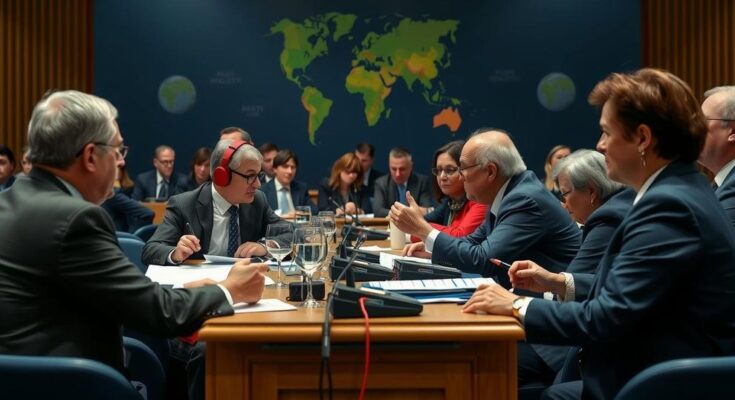The COP29 climate talks in Baku concluded with a contentious agreement on climate finance that stirred immediate backlash from several countries. While wealthy nations committed to providing $300 billion annually for climate assistance, representatives from nations such as India and Cuba criticized the amount as insufficient, raising concerns about the negotiation process. The event highlighted the ongoing challenges of achieving consensus in climate diplomacy amid escalating climate crises.
The recent climate negotiations in Baku concluded after intense discussions lasting over two weeks, culminating in a global climate finance deal, hastily approved in the early hours of Sunday morning. Although the agreement was celebrated by some delegates, it quickly faced backlash from several countries, including Cuba and India, who argued that the financial commitments were insufficient and criticized the process as undemocratic. India, in particular, expressed discontent regarding the agreed annual figure of $300 billion, labeling it excessively low and highlighting a failure to engage with objections raised during negotiations. The atmosphere was charged as nations voiced their discontent while others, including Azerbaijan’s COP president Mukhtar Babayev, maintained a stoic demeanor amidst the criticism. Despite the host nation’s efforts to manage the proceedings, including late-night coffee service for fatigued delegates, broader tensions and expectations for substantial action on climate change remained unresolved as the talks concluded.
The COP29 climate talks in Baku, Azerbaijan, were pivotal in addressing global climate finance, particularly the funds allocated from wealthier nations to assist poorer nations grappling with climate impacts. The conference faced significant scrutiny given Azerbaijan’s authoritative government and its reliance on fossil fuels. As 2023 was anticipated to be one of the hottest years on record, pressure mounted for a comprehensive and effective agreement. The dynamics of the negotiations reflected longstanding frustrations within the international community regarding the pace and adequacy of financial commitments to combat climate change.
The COP29 negotiations in Baku ended with mixed reactions to the approved climate finance deal. While the agreement itself was hailed as a step forward, it was quickly met with criticisms about its inadequacy and doubts regarding the process’s integrity. Countries like India and Cuba voiced significant concerns that the financial support pledged was insufficient, highlighting the ongoing debate over equitable climate responsibilities. This underscores the complexities and challenges inherent in international climate diplomacy, particularly as the urgency of climate change continues to escalate.
Original Source: www.france24.com




